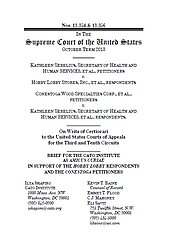Sebelius v. Hobby Lobby Stores, Inc.
Learn more about Cato’s Amicus Briefs Program.
In 1970 David Green founded a picture-frame company in his Oklahoma City garage. Since then, his company Hobby Lobby has grown into a leader in the arts-and-crafts retail industry, with 588 stores and around 13,000 employees across the United States. Ever since the company’s founding, the Green family—David, his wife Barbara, and their three children—has managed the company in accordance with their Christian principles. For example, Hobby Lobby is closed on Sunday and often purchases newspaper advertisements suggesting that readers seek Jesus. Following in his father’s footsteps, Mart Green also founded a business, a chain of Christian bookstores called Mardel, of which he remains CEO. In the Green family tradition, Mardel is also managed in accordance with religious principles. Thanks to the Affordable Care Act, however, the Greens are being forced to choose between operating their businesses in direct contravention of their deeply held religious principles or running them into the ground. Among Obamacare’s thousands of pages is a requirement that corporations with more than 50 employees provide coverage in their group health plans for certain medical services or else face severe additional “taxes.” These mandated services include certain methods of contraception, some of which function by preventing the implantation of a fertilized egg. Among the religious tenets that have guided the Green family’s spiritual lives and business decisions, however, is the belief that life begins when sperm fertilizes an egg. They are morally opposed to contraceptives that prevent implantation and thus destroy life. The Greens believe that being forced to provide health insurance that facilitates the use of such contraceptives is a substantial burden on their right to exercise their religion under the federal Religious Freedom Restoration Act, as well as under the First Amendment’s Free Exercise Clause. The Greens sued to protect that right and last year won in the U.S. Court of Appeals for the Tenth Circuit. Now the case is now pending in the Supreme Court, along with a similar case out of the Third Circuit, Conestoga Wood Specialties Corp. v. Sebelius, that involves a woodworking company run by a Mennonite family. These cases will determine whether individuals who wish to conduct their lives in accordance with their religious beliefs forfeit the right to do so when they engage in business activities, particularly through the corporate form. Cato has submitted a brief supporting Hobby Lobby and Conestoga. We argue that individuals should be able to order their professional lives according to their religious beliefs, that engaging in business doesn’t demand the surrender of religious freedom, and that there’s nothing inherent in the corporate form that requires denying the owners of a corporation the right to direct their business in a manner that comports with their religion. This is an important case because the corporate form is an essential tool for operating successfully in the complex modern economy and the right to exercise one’s religion—even through one’s business—is an essential right in a free nation. Nobody should have to choose between the two.

This work is licensed under a Creative Commons Attribution-NonCommercial-ShareAlike 4.0 International License.
